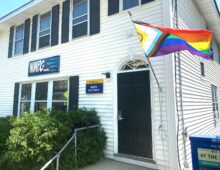WMPG honors and celebrates Pride. June will see special programming from our DJ’s and hosts. Pride Portland is on June 17th.
Wed, June 14th The Morning Beat’s Big Gay Disco with Annella 6.30am – 8.30am
Thursday, June 15th, 5pm – Mind Fuzz
- NY Mike will play sets devoted to LGBTQ+ artists in rock n roll.
Saturday June 17th – Rainbow Reflections – see archive below – recorded archives in parts (due to being unable to upload 1 full file)
- Join Annella and guests for special program facilitated by Megan McGregor (USM) and Steve Bull. June 17th – 8am – 10.30am
- Producer: Annella Linton. Engineer: Jessica Lockhart
- Facilitators/Hosts: Steve Bullen (Wilde Stein – Rainbow Resource Center), Megan MacGregor(University of Southern Maine Libraries)
- Guests (featured on this clip): Lois Galgay Reckitt, Wendy Chapkis, Dale McCormack, Howard ?
Part 1.
Part 2.
Part 3 (Guests: Wendy Chapkis, Dale McCormack, Howard)
Part 4 (Guests: Christopher Horack, Wendy Chapkis, Dale McCormack) What Pride Means to You.
Part 5 (Guests Wendy Chapkis, Dale McCormack, Lois, Call-in Amy)
Part 6 (Guest: Lois and Megan)
- Pilar (NPILAR) and Annella host an hour of music, trivia and chat. 10.30am – 11.30am
Saturday June 17th – The Worm 11.00pm
- Brothers Tom and Matt are celebrating Pride with Tom’s focus on “GAY WRATH”, featuring a lot of angry songs by queer musicians. Matt will be responding with happy/hopeful LGBTQ+ songs.
Frankie Knuckles Feature – House Music – Rhythm of the One 6/18
- The name “house music” originated from a Chicago club called the Warehouse that was open from 1977 to 1982. Clubbers to the Warehouse were primarily black, gay men, who came to dance to music played by the club’s resident DJ, Frankie Knuckles, who fans refer to as the “godfather of house”.
- Early house lyrics contained generally positive, uplifting messages, but spoke especially to those who were considered to be outsiders, especially African-Americans, Latinos, and the gay subculture. The house music dance scene was one of the most integrated and progressive spaces in the 1980s; the black and gay populations, as well as other minority groups, were able to dance together in a positive environment.
- While most post-disco disc jockeys primarily stuck to playing their conventional ensemble and playlist of dance records, Frankie Knuckles and Ron Hardy, two influential DJs of house music, were known for their unusual and non-mainstream playlists and mixing. Knuckles was influenced by and worked with New York City club Paradise Garage resident Larry Levan. Knuckles, often credited as “the Godfather of House” and resident DJ at the Warehouse from 1977 to 1982, worked primarily with early disco music with a hint of new and different post-punk or post-disco music. Knuckles started out as a disco DJ, but when he moved from New York City to Chicago, he changed from the typical disco mixing style of playing records one after another; instead, he mixed different songs together, including Philadelphia soul, New York club tracks, and Euro disco.
Monday, June 19th – Palm Wine Radio with-D.J. Zachariah 1pm
- The Persecution of LGBTQ+ Individuals in Africa
Africa, a continent renowned for its rich cultural diversity and history, unfortunately, remains a challenging place for many LGBTQ+ individuals. Despite significant progress made globally in recognizing and protecting the rights of sexual and gender minorities, a substantial number of African countries still exhibit deep-rooted prejudices and discriminatory practices against the LGBTQ+ community.
Understanding the persecution of gay people in Africa necessitates an examination of historical, cultural, and religious influences. Many African societies have historically adhered to conservative traditions, wherein heteronormativity is deeply ingrained. Additionally, colonial-era laws, inherited from European powers, often criminalize same-sex relationships. These laws, combined with societal attitudes, have created an environment where LGBTQ+ individuals are marginalized and subjected to harassment, discrimination, and violence.
Several African countries maintain laws that actively criminalize same-sex relationships. Penalties can range from fines and imprisonment to even life sentences in extreme cases. These laws perpetuate an environment of fear and stigmatization, effectively denying LGBTQ+ individuals their fundamental human rights. Such legal frameworks also hinder the establishment of organizations and support networks dedicated to advocating for LGBTQ+ rights.
In addition to legal obstacles, societal attitudes play a crucial role in perpetuating the persecution of gay people in Africa. Deep-seated cultural and religious beliefs often label homosexuality as immoral, deviant, or even un-African. These prejudices, combined with ignorance and fear, fuel discrimination, social exclusion, and violence against LGBTQ+ individuals. Family rejection, loss of employment, and ostracization from communities are some of the harsh consequences that many gay people face.
The persecution experienced by gay people in Africa takes a heavy toll on their mental health and overall well-being. Constant fear of discovery and subsequent repercussions can lead to high levels of stress, anxiety, and depression. The lack of social support and acceptance further exacerbates these challenges. Furthermore, the denial of basic rights and equal opportunities negatively affects LGBTQ+ individuals’ access to education, healthcare, and employment, perpetuating a cycle of marginalization and economic vulnerability.
While the situation appears bleak, there have been glimmers of hope and progress in recent years. Activists, both within Africa and internationally, are working tirelessly to challenge discriminatory laws and promote LGBTQ+ rights. Grassroots movements, NGOs, and civil society organizations play vital roles in raising awareness, providing support, and advocating for legal reform. International pressure, through diplomatic channels and economic incentives, can also encourage African governments to reconsider their stance on LGBTQ+ rights.
Education and dialogue are essential components in combatting the persecution of gay people in Africa. Increasing awareness about sexual orientation and gender identity, dispelling misconceptions, and fostering empathy can pave the way for societal acceptance. Engaging religious and community leaders, who hold significant influence, can facilitate the development of more inclusive narratives within African societies.
Monday, June 19th @1:00 PM, Palm Wine Radio will celebrate Pride Month by highlighting the oppression of the LGBTQ+ community in Africa, and acknowledge those courageous musicians who have taken a musical stand against these deep-rooted prejudices and discriminatory practices, and who advocate for all countries in Africa to recognize and protect the rights of all LGBTQ+ citizens, fostering an inclusive society where everyone can live with dignity and equality.
-D.J. Zachariah
Friday June 30th 6.30am – 8.30am – The Otherwise with Liz
- Music featuring LGBTQ+ country, folk and bluegrass from past to present
Jon McKenney interviews USM’er Freylis Black – Passionate People – date to be confirmed.



